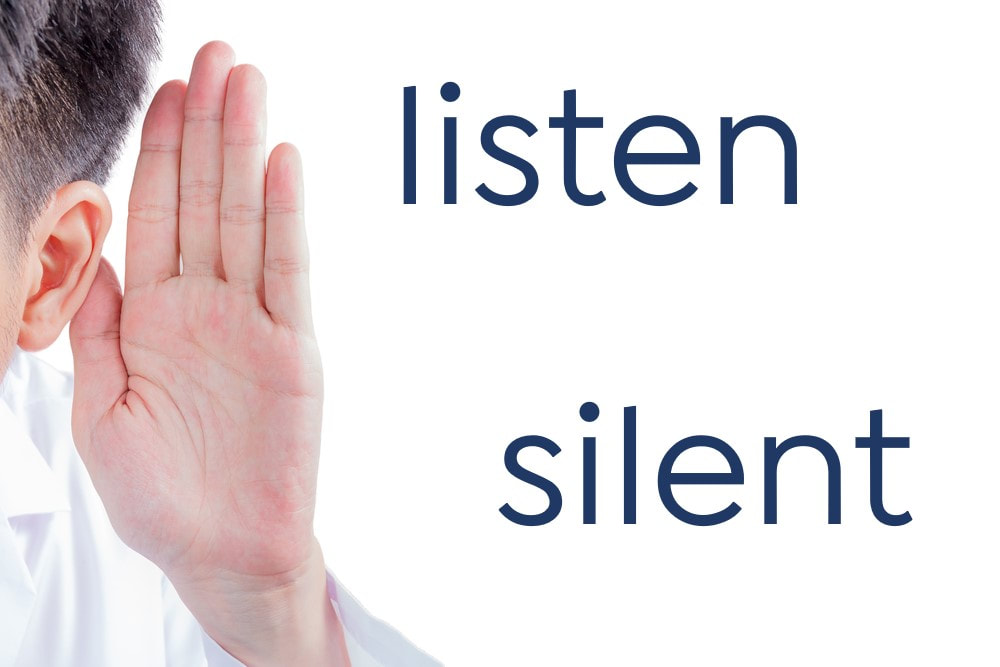The roots of effective leadership lie in simple things, one of which is listening. Listening to someone demonstrates respect; it shows that you value their ideas and are willing to hear them. JOHN BALDONI It was late Monday morning as I drove into a haven nestled in the Texas Medical Center: St. Dominic Village. It's a Catholic retirement and retreat facility and the peace was palpable as I drove towards the Joseph A. Fiorenza Priest Residence building. I was going to meet an old friend who I had met many years ago when I was in the seminary and hadn't seen in some years. As I cozied into a soft couch, we began to talk and catch-up. After a few minutes, I suddenly became aware that he was doing something I routinely do in coaching: He was really listening. It felt like the tables had been pleasantly turned on me. I hadn't been listened to like that in a while. He would ask a question and then be silent—not just physically silent, but it was apparent that his mind and spirit were quiet too; listening without judgement or agenda. I was given a rare gift that day and I am grateful for it and I am grateful for him and his friendship. The Anagram of Empathic Listening Silence is the foundation of empathic listening. It's intriguing how the words silent and listen share the same letters, emphasizing the symbiotic relationship between the two. To truly listen like my friend did with me, we must not only quiet our mouths but also silence our inner chatter—the thoughts, judgments, stories, and distractions that often clutter our minds. The Bigger Fish Story Syndrome Consider the phenomenon of the "Bigger Fish Story Syndrome," when instead of fully engaging with the speaker, we're preoccupied with formulating our response or recounting our own experiences, usually to one-up them. While I'm telling you about the big fish I caught this past weekend, you're already gearing up in your mind about the bigger fish you caught a year ago. This self-centered approach inhibits genuine communication, perpetuating what psychologist Carolyn Schwartz aptly terms the "dyadic monologue culture." I share something that's bothering me and you say, "That's too bad. Let me talk about what's bothering me." Bracketing True listening requires discipline, as psychiatrist Dr. M. Scott Peck suggests. He called it bracketing, "the temporary giving up or setting aside of one’s own prejudices, frames of reference and desires so as to experience as far as possible the speaker’s world from the inside, inside his or her shoes.” By embracing this practice, we create an open space for curiosity and new knowledge, respect, appreciation, and growth. In his poignant description, psychologist Dan Gottlieb highlights the transformative power of silence for him, "There was a new silence inside me, and in the silence I was able to hear people’s hearts. We can only hear with our heart when the noises of the ego are quiet. That’s when we’re open... It can be found when we listen with our hearts." Thus, to listen effectively, we must heed the anagram of listen and be silent, allowing us to listen with our hearts. The principal form that the work of love takes is attention… By far the most common and important way in which we can exercise our attention is by listening. DR. M. SCOTT PECK  Stress, Executive Functioning, & Listening The executive functions of the frontal lobes play a pivotal role in empathic listening. In addition to the higher abilities of conceptual thinking, recognizing and learning patterns, decision-making, planning, and organization, one of the most important executive functions of the frontal lobe is inhibition. It is because of our frontal lobes that we can inhibit and delay thoughts and actions in order to delay higher-order gratification and outcomes. That is why empathic listening is such work. We have to make the choice to inhibit our thoughts, emotions, and actions—one of the highest functions of our intellect—and that will take practice. Stress and other negative states and emotions restricts blood flow to our frontal lobes, and therefore, impedes the functioning of our executive functions. So, like my friend, we must quiet our mouth, our mind, our heart, and our spirit in order to fully empathically listen. Meditate to Regenerate To hone our empathic listening skills, we can cultivate mindfulness through practices like breath work, meditation, contemplation, and yoga. By focusing on our breath and clearing our minds, we reduce stress and enhance our ability to silence distractions and attune ourselves to others. Basic meditation offers a simple yet powerful technique to cultivate silence and enhance inhibition. By dedicating just five to ten minutes daily to mindful breathing and awareness, we prepare ourselves to be better listeners, creating an empty space that invites genuine connection and understanding. Alan's Basic Meditation Technique
"Be still and know that I am God" Psalm 46:10 In the realm of empathic listening, silence isn't empty; it's full of potential. It's a space where hearts connect, minds engage, and understanding blossoms. So let's embrace the silent art of listening and unlock its transformative power in our personal and professional lives. NEXT WEEK: Empathic Listening, Lesson 2: Get the Story Have an amazing journey today! Alan Mikolaj is a seasoned coach and leadership development consultant with nearly 20 years of experience. He is passionate about helping leaders transform their leadership, their teams, and their organizations. He has an impactful, professional approach driven by a passion for meaning and purpose, a growth mindset, and a commitment to excellence and service in order to drive change and results. Alan holds his Master of Arts in Clinical Psychology and Associate Certified Coach credential with the International Coaching Federation (ICF) and maintains their ethics and standards of behavior, including the standards regarding confidentiality. You can learn more about them on the ICF website. Transformational change starts with a conversation! Alan is on a mission to partner with like-minded leaders who want to make a positive difference in the world. Schedule your free, one-hour session by clicking here: Discovery Conversation with Alan Or call or email: Contact Page
0 Comments
Leave a Reply. |
Alan Mikolaj
Alan Mikolaj is a a professional, experienced, positive, and passionate speaker, leadership and organizational development consultant, change agent, author, and coach. He holds his Master of Arts degree in Clinical Psychology from Sam Houston State University. He is a certified graduate coach from Coaching Out of the Box and holds his ACC and membership with the International Coaching Federation (ICF). Free Discovery Conversation!
Impactful change starts with a conversation! Schedule your free, one-hour session by clicking here: Discovery Conversation with Alan
Or call or email: Contact Page In his third book, A Travel Guide to Leadership, Alan offers you simple, fundamental, and powerful lessons that have the power to transform you, your relationships, and your career.

Blog Archives
July 2024

Linked2Leadership
Ranked #1 Business Blog! |
|
CONTACT
TEL: 346-291-0216 EMAIL: [email protected] SCHEDULE TIME WITH ALAN Free Discovery Conversation with Alan |








